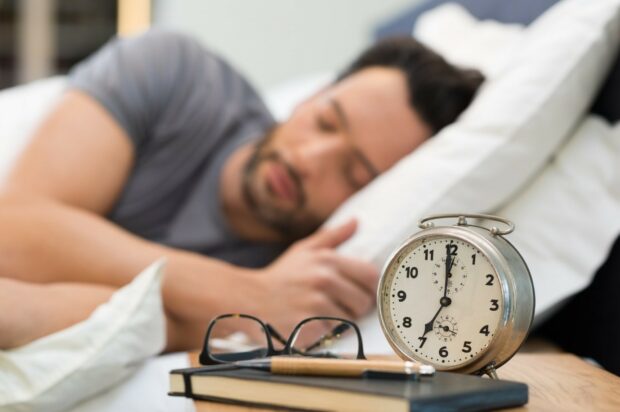According to the American Sleep Apnea Association, there are between 50 and 70 million Americans who have sleep-related problems. One study found that 70% of adults had insufficient sleep at least one night a month.
Not receiving enough sleep one night might not seem like a big deal, you just spend the next day a bit tired and grouchy. However, not getting enough sleep can have long-lasting effects on your health and increase your risk of heart disease, obesity, diabetes, and high blood pressure. One thing that might be able to help is vitamins.
Discover these vitamins for better sleep and see if you can improve your sleep quality tonight.

1.Increase Your Vitamin D
There are a variety of vitamins for sleep and anxiety to try, but one that might have a positive effect on your sleep is vitamin D. Some research shows a correlation between poor sleep quality and low levels of vitamin D.
You can get vitamin D from sunlight, certain types of food, and supplements. However, many people might not be getting enough vitamin D in their diet, which results in poor sleep. Vitamin D can be found in mushrooms, eggs, tuna, and salmon. The recommended daily intake of vitamin D is 600 IU.
It’s important to discuss your levels of vitamin D with a doctor before taking supplements. Having too much vitamin D can cause nausea, vomiting, constipation, and even kidney stones. Your doctor will be able to determine if your vitamin D levels are too low and how much you need to top it up and get a good night’s sleep.
2.Add More Vitamin B
If you’re looking for vitamins for good sleep you need to look at the vitamin B family. B3, B5, B6, B9, and B12 all help to regulate the body’s supply of Tryptophan (which helps with the body’s ability to produce melatonin). Melatonin is the hormone that is produced in your body that makes you feel sleepy.
You can find B vitamins in a variety of whole grains, meats, fruit, and vegetables, which means if you eat a healthy diet then you might be able to get these vitamins. However, if you don’t think you’re getting enough B vitamins, then you can always take some supplements.
Each vitamin in the group have their own benefits, for example, vitamin B5 can help to reduce stress and help you get to sleep quicker. While vitamin B6 can help ease anxiety, ensure you get a better night’s sleep, and make you feel more refreshed when you wake. This means you can take individual B vitamin supplements, or alternatively, you can take a supplement that contains all B vitamins.
3.up Your Iron Intake
If you’re struggling to sleep, or experience fatigue and sleep disturbance, then your body might be low on iron. Iron helps to transport oxygen in your body and will improve your chance at better quality sleep.
Iron can be found in meat, such as chicken, turkey, lean beef, oysters, and vegetables, such as spinach and baked potatoes. It can also be found in beans, tofu, lentils, cashews, whole-grain bread, and fortified cereal.
However, some people still struggle to get enough iron into their diet and body, so they choose to take iron supplements too. If you are taking iron supplements then increasing your vitamin C might help you absorb it better.
Iron can be used as sleep vitamins for kids and adults, however, the daily recommended amounts of iron differ.
4.Get More Calcium and Magnesium
Some vitamins for sleep apnea and related sleeping disorders aren’t actually vitamins. For example, calcium and magnesium are two minerals that can help improve your sleep. These two minerals can help relax your muscles, making your sleep easier and better.
If you don’t have enough calcium and magnesium in your body, you might encounter interruptions while you sleep. Calcium also tryptophan in producing melatonin.
Calcium and magnesium can both be received in your diet, by eating dairy products, nuts, seeds, and green vegetables. Additionally, you can also get supplements for both minerals that can contribute to a healthier you and a more restful night’s sleep.
5.Try Tryptophan
As mentioned already, tryptophan can help you sleep, as it helps to produce melatonin. Tryptophan, which is an amino acid, also ensures you have healthy sleeping patterns.
You can find tryptophan in a variety of foods, such as sweet potatoes, chickpeas, milk, poultry, eggs, fish, red meat, and sunflower and pumpkin seeds. But if you can’t get enough tryptophan in your diet, then you can always take some supplements to increase your intake.
6.Mellow Out With Some Melatonin
Melatonin may help to get your body in the mood for sleep. This hormone is produced naturally in your body and helps to regulate your body’s day and night circadian rhythm.
Despite it being produced in our bodies, some people seem to have less melatonin in your systems than others. That’s why if you’re struggling with sleep then you should try melatonin for a two-week trial. Introducing short stints of melatonin can help guide your body clock into the right sleeping pattern.
If you struggle to swallow supplements then there are also gummy options, such as these easy to eat vitamins that are packed with everything you need to get the sleep you deserve.
Rest up by Trying Out These Vitamins for Better Sleep
Nobody enjoys countless hours of tossing and turning, so if you struggle to get to sleep or stay asleep, then you need to try out the above vitamins for better sleep. Remember to ask your doctor before taking vitamin supplements, as some might not be right for you. Your doctor might also be able to suggest which vitamins will work best for you and your sleeping problems.
Check out some of our other health articles to find out more about how you can improve your sleep.



